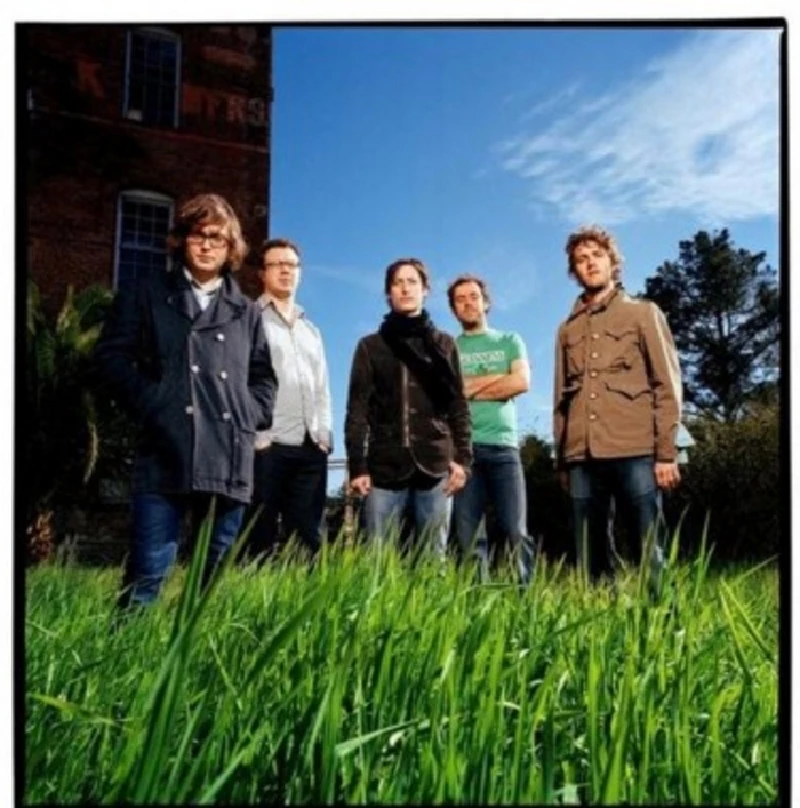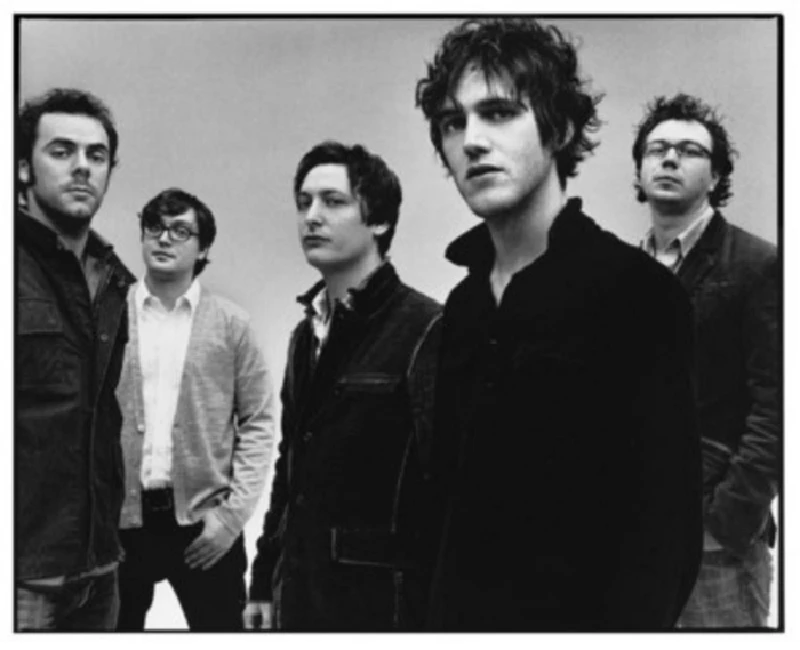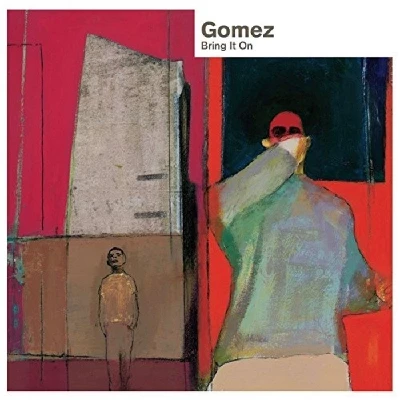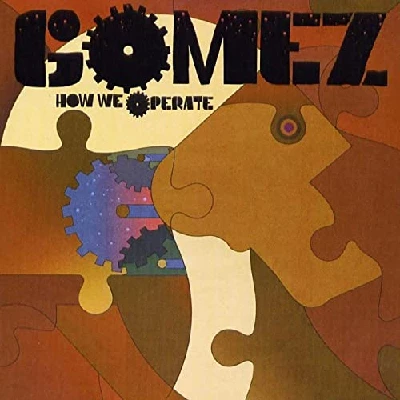Gomez - Interview
by Benjamin Howarth
published: 18 / 5 / 2011

intro
In our second interview with them, Mercury Prize winning band Gomez's drummer and percussionist Olly Peacock speaks to Ben Howarth about their new and seventh album, 'Whatever's On Your Mind'
You may well be sick of reading bands introducing a new album by deprecating the last. A common enough tactic – when the last one burned bridges with fans, if there were many in the first place. But sometimes it’s sincerely felt. “I’m particularly excited about this album. We knew that we had no choice but to make a great record”, says drummer, percussionist and also co-songwriter Olly Peacock of the ambition that Gomez carried with them as they set about recording their seventh album, ‘Whatever’s On Your Mind’. “It had to better any album we’ve made in a long, long time”. “When you’ve done so many records, you can end up doing the same thing over and over,” he tells me over the phone from New York. “We’re very happy with the outcome. I think we’ve really pushed ourselves. I don’t know if we’ve ever been as confident in a record after we’ve finished it as we are this time.” I happen to think he’s being a bit unfair to his earlier albums, none of which sound especially alike. Much like the Super Furry Animals, they began with rampant eclecticism, embraced electronica and then up-tempo rock, before settling into warped psych-pop. 2006’s ‘How We Operate’ saw the band polish their ragged blues into a sixties-pop sheen, while 2009’s ‘A New Tide’ tilted in the direction of folk. ‘Whatever’s On Your Mind’ updates the band’s stock of pure-pop songs while also offering some of their finest ballads (courtesy of the still-astonishing smoky rasp of Ben Ottewell), blues workouts and (hidden away for the benefit of repeat listeners) some of their more ambitious arrangements. You have to hope, that the increasingly indifferent British press might see this listener-friendly album as a prompt to give Gomez (who went out of fashion when the Strokes brought skinny jeans and Converse back into it) a second chance. Peacock agrees that the band have focused far more on America than they have on England. “For sure,” he replies when pressed on this. “But that’s more indicative of the music scene in England.” “When we started,” he goes on, “the music industry in Britain was just at the tail end of its pinnacle. Lots of bands were signed, and everyone was throwing money around”. “What had happened by then is that bands had to become big from one album, or they wouldn’t get a second chance. We were lucky and we got enough attention from our first record, but then later, because you’re not the freshest thing on the block, people’s attention goes elsewhere.” This trend is exacerbated by music critics seemingly instinctive habit of putting things down. “Those snarky attitudes are a bit too malicious,” Peacock says. “But that’s just the way it is.” Even as they were basking in the glow of a Mercury Prize awarded to their first album, Gomez had decided that their band would “always be about longevity.” America has proven better suited to those ambitions. “We still want to make better records, to improve our songwriting and our performances, and we’re still striving to do it. And we want for people to be able to hear the music.” “We have had to chisel away at the States,” he stresses. “Some bands think that because they’ve had some success in the UK, they can go to this huge country and not have to do anything to get the same success there. But we’ve been back lots of times, and slowly we’ve found ourselves a growing fanbase”. As Ian Ball explained when he spoke to this website in 2006, much of that fanbase comes from the ‘Jam Band’ scene, who like their drum solos long and their guitar solos unrehearsed. It made for the unlikeliest of tracks, such as 'Army Dub',a quirky instrumental on 'In Our Gun', into fan favourites. Unswayed, Gomez have made their shortest album, and it seems that the focus this required is what have made them so happy with it. “This was a completely different process from anything we’ve done before,” Peacock explains. “The big change was that we went into the studio with finished songs.” Circumstances required a changed working method. “The band are now living all over the place – I’m in Brooklyn, Ian is in Los Angeles and the others are all in different parts of England.” But there was a clear determination to be more focused, with the band determined to arrive in the studio with a plan of action, ready to record and confident in their choices. “We started with a goal of spending no more than seven weeks recording the album,” Peacock says. “And of all having about two songs each ready to record before we went into the studio.” A band spread across the Atlantic risks drifting apart. Indeed, since ‘How We Operate’, the band’s three main vocalists have all made solo albums. In spite of this, the band rediscovered the collaboration that had fuelled the success of their first album. “Everyone had to write – whether it was verses and choruses, or just a loop and a guitar part,” guitarist and vocalist Tom Gray said recently. Peacock elaborates, “We would all work on demos and share them with the rest of the group. Then we would send it to each other, and we’d all work on the songs and add to them. It was a transatlantic writing relationship – and it ended up working really well.” “The way it operated,” he goes on “is that I would start to come up with a song. I would usually start with a guitar part and then some drums or a loop, and then maybe some vocal harmonies. I’d then send it out into the atmosphere, and meanwhile I’d be listening to other things people had been working on.” “If somebody else liked one of the songs sent out, they’d start working on it. Sometimes they might like a particular part of a song, but take out other parts and add something new. Or they’d just add extra instrumental parts.” “At the end of this process, we had lots of songs that had all been worked on by all of us, and it meant that we had better choices to make when we came to record the album. We weren’t rushing to finish songs off just before we tried to record them. We were certainly more organised, and there was no writing in the studio, which made for better songs. I found the whole thing much more liberating.” For a band that has a reputation largely forged on the back of live performances, with a reputation for songs emerging out of jams and improvisation, the thought of them sitting in their living rooms, writing alone seems odd. But Peacock thinks it worked considerably better than relying on inspiration to strike when the band reconvened. “I think that we achieved more than we would have if we’d all got together and sat in the same room," he says. “Before” he goes on “albums would slowly fall into place. We’d come to the studio with ideas that we’d then have to polish.” For the first time since their 2001 album 'In Our Gun', Gomez decided not to hand over production to an outside producer. “We wanted to have the reins again,” Peacock explains. “It’s something that makes sense in the digital age.” Furthermore, with the band having spent so much time demoing the songs, much of the producer’s work had already been done. The band, however, did enjoy the helping hands of old friend Sam Farrar – once of Phantom Planet – who, as well as offering studio nous and the ability to play a lot of instruments, made suggestions on how to improve the arrangements of each song, took some songs from their halfway stage to completion and helped decide the final track-listing. In fact, the process of choosing which songs were to be recorded for the album extended beyond Farrar and the five full time members of the band to the management and label. The songs were “chosen completely democratically”. Peacock thinks, hwowever, that the songs that everyone liked and deserved to be included stood out. “It was obvious,” he says, “which of the songs were better, and were going to be on the album”. What emerged is a subtle, if not revolutionary, shift from what Peacock feels was the “mellow folk” of 2009’s 'A New Tide' to something with “more naturalness, something more typical of us.” “This album is certainly more eclectic, and it succeeds in covering the gauntlet of all the things we do. We had access to lots of toys and synths, and there’s a much wider range of sounds underneath each song”. ‘Whatever’s On Your Mind’ ends up, Gomez feel, as “a fairly good representation of all the demos” recorded during its creation. When Gomez tour the UK in June, it will be the first time that these songs are heard from a stage. Peacock says that the band’s friends and family have all been very complimentary about the new album, and that they have never been more satisfied at the completion of a record. But, playing new songs to an audience is “the only time you can see what people make of the record. You get visual feedback, and can see how people respond to parts of each song.” “Will the crowd cheer as much for the new songs as they do the old ones?” he asks. “Some of the songs will be much better live than they are on the record. Sometimes you record a song, and it sounds great, but you know that nobody is going to turn their stereo up to eleven at home. Sometimes people need to have the songs live, played loud, for them to work properly.” Assuming all goes well, there are no signs that Gomez’s seventh album will be their last. But, nevertheless, Peacock is hoping to become the fourth Gomez to release a solo album. “I’d like to… just to see,” he says. “It’s an exciting and daunting prospect. I have no idea what would come of it, but I want to do some very diversely different things musically from what I’ve ever done in Gomez.” Before then, we can bask in an album that does two important things – give the impression that it will sound great rolling over the countryside as people drive to beaches, test matches and music festivals and, more importantly, makes you want to play it over and over again.
Band Links:-
https://www.gomeztheband.com/https://www.facebook.com/gomez/
https://twitter.com/gomeztheband


interviews |
|
Interview (2006) |

|
| Winners of the Mercury Music Prize with their 1998 first album 'Bring It On', Gomez have met with critical indifference since then, but have kept an enthusiastic following. Singer Ian Ball chats to Ben Howarth about his band's new album 'How We Operate' |
live reviews |
|
Roundhouse, London, 21/6/2011 |

|
| Mercury Music Prize winners Gomez have always been more out than in fashion, but Ben Howarth watches them play a near perfect set to promote their new album 'Whatever's On Your Mind' at the Roundhouse in London |
| Hammersmith Apollo, London, 23/11/2006 |
favourite album |
|
Bring It On (2018) |

|
| Cila Warncke finds that an outsized 20th Anniversary Edition four CD re-release of Gomez's Mercury Music Prize winning 'Bring It On' captures the brash charm of their youthful debut |
features |
|
Gomez (2006) |

|
| Mercury Prize winners Gomez recently released a new album 'How We Operate' and toured the United Kingdom. Anna Gudaniec photographs them exclusively for Pennyblackmusic at Shepherd's Bush Empire in London |
reviews |
|
How We Operate (2006) |

|
| Self-deprecatingly, but excellent comeback album of sorts from the under rated and out-of-fashion Gomex |
| Split The Difference (2004) |
most viewed articles
current edition
Carl Ewens - David Bowie 1964 to 1982 On Track: Every Album, Every SongArmory Show - Interview with Richard Jobson
Colin Blunstone - Thalia Hall, Chicago, 16/7/2025
John McKay - Interview
Visor Fest - Valencia, Spain, 26/9/2025...27/9/2025
Bathers - Photoscapes 1
Billie Eilish - O2 Arena, London, 10/7/2025
Robert Forster - Interview
Loft - Interview
Sir Tim Rice - Interview
previous editions
Heavenly - P.U.N.K. Girl EPManic Street Preachers - (Gig of a Lifetime) Millennium Stadium, Cardiff, December 1999
Beautiful South - Ten Songs That Made Me Love...
Oasis - Oasis, Earl's Court, London, 1995
Trudie Myerscough-Harris - Interview
Prolapse - Interview
Pixies - Ten Songs That Made Me Love...
Coldplay - Wembley Arena. London, 16/8/2022
Boomtown Rats - Ten Songs That Made Me Love....
Peter Perrett - In Dreams Begin Responsibilities Interview Part One
most viewed reviews
current edition
Amy Macdonald - Is This What You've Been Waiting For?Sick Man of Europe - The Sick Man of Europe
Lucy Spraggan - Other Sides of the Moon
Davey Woodward - Mumbo in the Jumbo
Phew, Erika Kobayashi,, Dieter Moebius - Radium Girls
Alice Cooper - The Revenge of Alice Cooper
Bush - I Beat Loneliness
Blueboy - 2
Suzanne Vega - Flying With Angels
Cynthia Erivo - I Forgive You
Pennyblackmusic Regular Contributors
Adrian Janes
Amanda J. Window
Andrew Twambley
Anthony Dhanendran
Benjamin Howarth
Cila Warncke
Daniel Cressey
Darren Aston
Dastardly
Dave Goodwin
Denzil Watson
Dominic B. Simpson
Eoghan Lyng
Fiona Hutchings
Harry Sherriff
Helen Tipping
Jamie Rowland
John Clarkson
Julie Cruickshank
Kimberly Bright
Lisa Torem
Maarten Schiethart